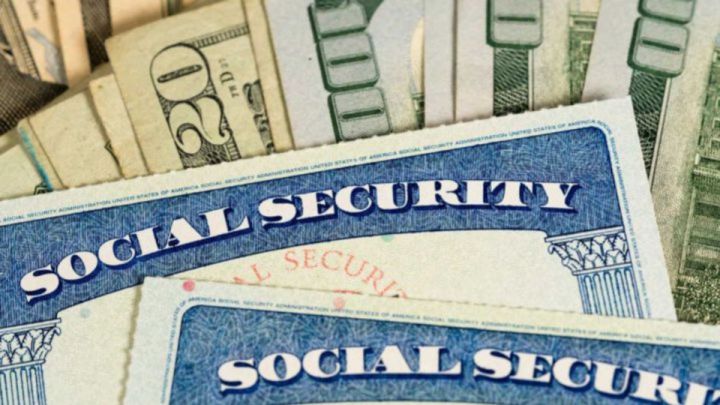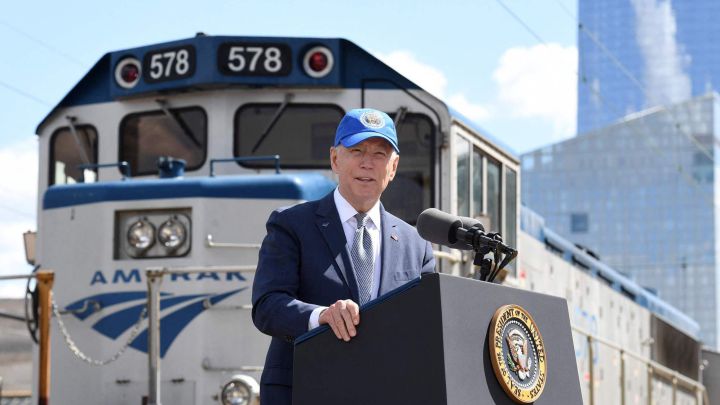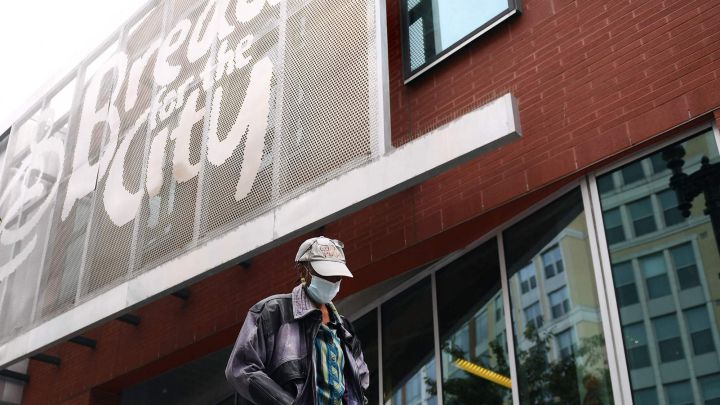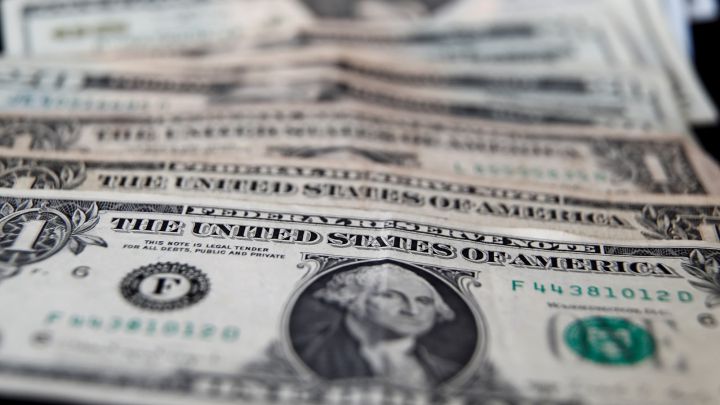Fourth stimulus check | News summary for 8 November
Latest news as President Biden seeks support for his Build Back Better agenda, plus new stimulus payments, the Child Tax Credit, Social Security increase.
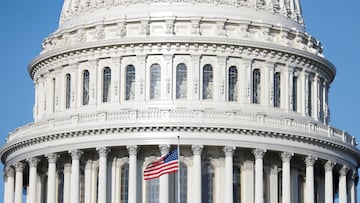
Show key events only
US stimulus checks: live updates
Buttigieg says infra bill will address racial inequalities highway design
Transportation Secretary Pete Buttigieg has that a portion of the $1.2 trillion infrastructure bill will be used to address racial inequities in U.S. highway design.
"[A]t least 40% of the clean investments in this bill will go to benefit the communities that are overburdened and underserved," Buttigieg said at a briefing.
"If an underpass was constructed such that a bus carrying mostly Black and Puerto Rican kids to a beach ... in New York was designed too low for it to pass by, that ... obviously reflects racism that went into those design choices."
"I don't think we have anything to lose by confronting that simple reality and I think we have everything to gain by acknowledging it," he added.
Yarmuth on McConnell
Senate Minority Leader Mitch McConnell said that he is “delighted” the House passed the Biden infrastructure bill. But JohnYarmuth says Sen. McConnell “doesn’t care about being called hypocritical” because he knows he won’t be held accountable..
Infrastructure "finally" passed: Biden
The US House of Representatives finally passed a sweeping $1tn (£722bn) infrastructure bill, after weeks of wrangling between progressive and moderate Democrats.
The long-awaited legislation now heads to President Joe Biden's desk for a final signature.
There's a proposed $550bn in direct federal spending for infrastructure - about what was spent in 1956 to build the US interstate highway system.
SNAP backlog creates challenges for struggling families
Colorado based journalist Katie Eastman is reporting that the SNAP backlog in her state is creating challenges for families in desperate need of assistance. More people in Colorado are claiming SNAP benefits compared to any other point in the pandemic, and for people who need to have their benefits recertified, the backlog has very real consequences.
When will the next Child Tax Credit be made?
The second to last Child Tax Credit payment in 2021 will be made on 15 November. The last will be made on 15 December. Families will be able to claim the remaining value of the credit when they file their taxes next year.
Which states have seen the highest increases in initial unemployment claims?
The Department of Labor announced last Friday that in October the US had added over 500,000 jobs. The report came as positive news for many after months of lackluster numbers.
However, some states are continuing to see increases in initial unemployment claims, including:
1. District of Columbia (+3,875)
2. Kentucky (+2,940)
3. Missouri (+2,048)
4. Florida (+1,307)
5. Oklahoma (+1,256).
Read the full report.
How can you claim higher social security benefits?
Many seniors and advocacy organizations are concerned that the historic 5.9 percent COLA increase will not be enough to boost the purchasing power of some of the nations oldest members.
Our team took a look at other federal programs that could help retirees increase their monthly incomes. Additionally, we took a look at ways workers can maximize their benefit amounts. Read more.
The Economic Policy Institute compared the unemployment rate for those older than sixteen across racial groups. None of the groups have reached their pre-pandemic levels and experts warn that Black unemployment has held steady in recent months as other groups have seen decreases.
Major components of the reconciliation bill are supported by voters in the US
Data for Progress has released the results of a recent poll which looked at public support for the main items included in the $1.75 reconciliation bill. The poll was conducted between 29 October and 1 November and surveyed "1,177 likely voters nationally using web panel respondents."
The pieces with the highest support are investments in long-term care facilities (78 in favor/15 oppose), expanding Medicare to include hearing (75 in favor/16 oppose), and investments in public housing (66 in favor/26 oppose).
On Jon Stewart's new show he spoke with Treasury Secretary Janet Yellen about President Biden's Build Back Better agenda. The two also debated the ways in which multinational corporations are able to pay workers wages that make them dependent on federal welfare programs like SNAP.
Will prices continue to increase this year?
This year, consumers have seen stark increases in prices across many product groups, including food. With many families planning to return to a more normal "holiday season" many are already assuming that prices will continue their increase through the rest of 2021.
Fed's Randal Quarles to resign at end of December
Randal Quarles, who served as the U.S. Federal Reserve's Vice Chair for Supervision and the country's most powerful bank regulator, announced Monday he will step down at the end of December, ending a contentious four-year term during which critics say he was far too friendly towards Wall Street.
CTC deadline reminder
The Inland Revenue Service remind customers that low-income families still have a week to be able to to sign up for advance Child Tax Credit payments with 15 November being the deadline.
Bipartisan infrastructure bill includes fund to protect against cyber-attacks
In 2020, cyber-criminals were busy asking for ransoms to unlock the files of individuals, companies, municipal governments, infrastructure and more. CNN reports that ransomware victims paid out $350 million in ransoms in 2020, a 311 pecent increase from the previous year.
However, that is probably just a drop inthe bucket, not to mention the cost of rebuilding computer infrastructure for those who didn't pay. Part of the bipartisan infrastructure bill will provide $50 billion to make the US more resilient against cyber-attacks as well as protect against droughts, heat, floods and wildfires.
Changes to the Child Tax Credit in 2022
Depending on whether or not President Biden and the Democrats can get the Build Back Better bill over the finish line before the end of the year will make a big difference for the Child Tax Credit in 2022. The American Rescue Plan greatly expanded the tax provision giving a considerable boost to houehold finances in 2021 without having to wait to claim the credit in 2022 on a tax return.
The changes made this year are temporary though and will expire at the end of the year if no action is taken. The advance payments will end, the refundable portion of the credit will drop to $1,400 out of a $2,000 maximum credit. Additionally, in order to begin claiming the credit, taxpayers will have to report at least $2,500 of "earned income" meaning those on benefits, like grandparents that are raising their grandchildren, that don't have other forms of income will be ineligible.
One of the best features for taxpayers in the Build Back Better bill, besides the continuation of the monthly advance payments, makes the Child Tax Credit fully refundable permanently, even if it isn't extended again after 2022. This will help families without "earned income" continue to be able to claim the tax, which in turn will help reduce childhood poverty.
Bipartisan infrastructure bill brings expanded Amtrak service
The bipartisan infrastructure bill which the House finally passed after a three-month delay will invest $66 billion in additional rail funding which will allow Amtrak to repair and modernize existing lines as well as expanding rail service. According to Smart Cities Dive, Amtrak expects to add 30-plus new routes and 160 coummunities would see new service if the program is fully implemented.
Market reacts favorably to bipartisan infrastructure bill passage
Markets rose Monday morning, the first trading day since the passage of the $1.2 trillion infrastructure bill. Companies in the industrial and raw matrials sectors, which will benefit from the federal investments, saw there options move higher.
The largest publicly traded companies also saw their stocks rise with one notable exception, Tesla. Over the weekend founder Elon Musk asked his Twitter followers if he should sell 10 percent of his stock so that he would be able to pay taxes, he says he doesn't pay taxes now because he has no income just his stock profolio. He made the inquiry after a "billionaires tax" had been mooted as a potential revenue source for programs in the Build Back Better bill.
The majority voted that he should causing the expectation that he will dump stock on the market. However CNBC reports that he would have to start selling some of his shares no matter what as he faces a tax bill of more than $15 billion in the coming months on stock options.
How much money has the House approved for the bipartisan infrastructure bill?
The Infrastructure Investment and Jobs Act, better know as the bipartisan infrastructure bill, finally got its long-awaited vote in the House late on Friday. It passed with a 228-206 vote with the help of Republican votes to cross the finish line.
President Joe Biden plans to sign the $1.2 trillion infrastructure bill when Congress returns from a week-long recess. The legislation is the largest investment in US infrastructure since the federal interstate highway system was created under President Eisenhower nearly 70 years ago.
Full detailson where the investments will go
Don't call Build Back Better a 'social safety net bill'
John K. Roman, a senior fellow at NORC at the University of Chicago in the Economics, Justice and Society Group, doesn't want President Biden's Build Back Better bill to be called a 'social safety net' because the term doesn't capture the reality of what the proposals would do for Americans. Instead he says these are investments in people and there's evidence to back that up. The following is his arguement to the point posted on Twitter...
'This week or next, the House will likely vote on the $1.7 trillion Reconciliation Bill which is starting to get the label the 'Social Safety Net' bill. I want to argue here FOR the bill, but strongly AGAINST the phrase social safety net. That moniker is a huge problem.
'The programs in the $1.7 trillion Reconciliation Bill are, overwhelmingly, evidence-based prevention programs. They are not a last-ditch, stop-the-bleeding bandaid, which safety net implies. They are investments in people and opportunity. That’s how we should describe them.
'A little history is clarifying. President Reagan coined the term 'social safety net' in 1981, when he made a very qualified argument for the safety net, “All those with true need can rest assured that the social safety net of programs they depend on are exempt from any cuts”
'Big caveat though. While Reagan was against cutting programs that are not means-tested (Social Security, Medicare, and Veterans benefits) anti-poverty programs that were means-tested (Medicaid, AFDC) were fair game.
'And over time the meaning of the 'social safety net' split along these lines. Social security, Medicare and VA benefits are not really looked at anymore as safety nets—there are de facto rights. Anti-poverty programs, however, are fair game for political attacks.
'And that’s a big problem. The new investments proposed in the Reconciliation Bill do not build on the wildly popular safety-nets-as-rights bits, but rather the underinvested means-tested political football bits. It’s no surprise it’s a political football.
'Another problem is that the 'social safety net' implies catching you when you fall. But of course, many people don’t fall into the safety net, they are born there and live there. Climbing up a net is tough stuff, climbing out of a net is a whole different level of challenge.
'The last problem with the term 'social safety net' is that it implies a fix. No one is arguing problems should not be fixed when they emerge. But every fix is at least a tacit admission of a policy failure—an acknowledgment that a problem was not prevented before it started.
'So, what do I think the message should be for the $1.7 trillion Reconciliation Bill? Call these programs what they are—big bets on the American people! Big, data-driven, evidence-based bets that investing in the American people will pay big dividends.
'Let’s look at the programs real quick and see how they prevent problems rather than slap on a band-aid. Improving access to high-quality childcare, paid family and medical leave can reduce fatal child trauma.
'Improving access to high-quality childcare helps two generations: it reduces the abuse of children and increases parents' ability to work and raises their income.
'Improved access to better childhood nutrition programs and routine, preventative healthcare reduce infant mortality and improve children's outcomes throughout their lives.
'And finally, the child poverty tax credit is as close to a silver bullet as exists in the policy arsenal. It reduces dropout, delinquency, and teen pregnancy and improves school outcomes, future employment, and physical and mental health.'
Will Social Security beneficiaries get a fourth stimulus check?
As prices in the Untied States have hit record high, many seniors have reported cutting down on the number of meals they eat and even leaving perscriptions at the pharmacy because they can't pay. The majority of those over sixty-five in the US receive social security benefits and around half also draw from private retirement accounts. However, as they are unable to work, they live on a fixed income which when inflation hits can make life very challenging.
While the federal government has announced a 5.9 percent COLA increase for 2022, some seniors rights advocacy organizations like the Senior Citizens League (SCL) say that it isn't enough. The SCL is calling on Congress to send a $1,400 check to those receiving Social Security to help these households balance their budgets.
Read our full coverage for more information on chance of a fourth check being sent to Social Security beneficiaries.
Why are so many workers quitting their jobs?
More than 4.3 million workers voluntarily left their job in August, a new phenomenon dubbed The Great Resignation. Many workers are looking for higher pay and greater flexibiility and a recent study found that more than 50% of people are currently reporting that within the next year they plan to look for a new job.
Is the federal government still planning on canceling student debt?
CNBC takes a close look at this question. Earlier this year, student debt cancellation gained much steam but in recent months, the likelihood of it happening seems to be dwindling.
Maryland Governor Larry Hogan speaks out against the Reconciliation Bill
Gov. Larry Hogan (R-MD) stopped by CNN to talk about the Democratic plan to pass the Reconciliation Bill, arguing that the American people "They're not where the progressive caucus is, I can assure you, and vast majority of Americans are not for the [reconciliation] bill."
Evictions continue to grow, even when federal aid is available
The American Rescue Plan allocated billions in rental assistance to protect them from eviction. With the moratorium on evictions expired, many tenants are beginning to be removed from their homes. Goldman Sachs had estimated that more than 750,000 evictions could take place by the end of this year.
The New York Times is reporting that federal funds may not being disbursed properly because billions have yet to be used by tenats or local governmetns and yet many are being kicked from their homes.
House budget bill is tax break for trial lawyers
A piece in the WSJ this morning points to the House Democrats’ 2,100-page budget bill being chock full of goodies for liberal special interests, and one of the worst is a tax break for their dear friends in the plaintiffs bar. While raising taxes on businesses, Democrats want to subsidize more frivolous lawsuits against business.
The IRS generally bars lawyers working on contingency-fee cases from deducting expenses such as depositions, expert testimony and discovery until a case resolves. In contingency-fee arrangements, attorneys front the costs of a lawsuit in return for some share—usually 30% to 40%—of the client’s eventual settlement or award.
Unemployment continues to decrease in the US
After months of lack-luster jobs numbers, the Department of Labor's October report surpassed expectations when it announced that more than 530,000 jobs had been added to the economy.
Nationally, the unemployment rate stands at 4.6%, dropping 0.2 percent from September. Sectors that saw the greatest payroll gains included "leisure and hospitality, in professional and business services, in manufacturing, and in transportation and warehousing."
Why can my Social Security direct deposit be late?
Are you still waiting for your Social Security payment? Have you been a beneficiaries for more than a year? Read our full coverage for the most common delays and how to contact the Social Security Administration.
Rep. Jayapal hopes for a reconciliation bill vote before Thanksgiving
With the Bipartisan Infrastructure bill on the way to President Biden's desk for signing, the Chairwomen on the Progressive Caucus speaks on the Sunday shows on when she expects the reconciliation bill to passed.
However, various Republicans were also featured on various programs this weekend advoctaing that Democrats drop the bill as it is their belief that the public does not support the measures.
Hello and good morning! Throughout the day AS USA will be bringing you all the latest updates from Washington as the White House looks to find agreement on President Biden's huge reconciliation package proposals.
We'll bring you news on the Child Tax Credit, Social Security increase, Medicare expansion and what hopes of a fourth stimulus check in the near future...
- Coronavirus stimulus checks
- USA coronavirus stimulus checks
- Inflation
- Joseph Biden
- Covid-19 economic crisis
- Science
- Coronavirus Covid-19
- Economic crisis
- Economic indicators
- United States
- Pandemic
- Coronavirus
- Recession
- North America
- Economic climate
- Virology
- Outbreak
- Infectious diseases
- Diseases
- Microbiology
- America
- Medicine
- Economy
- Biology
- Health
- Life sciences
